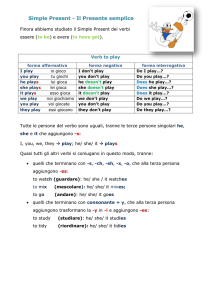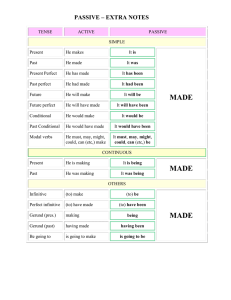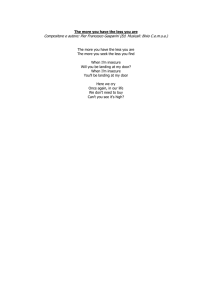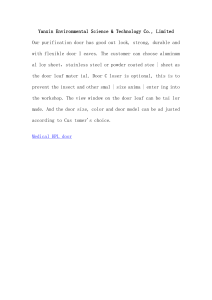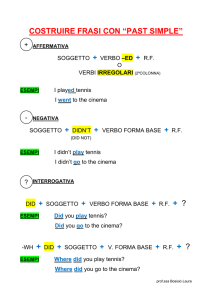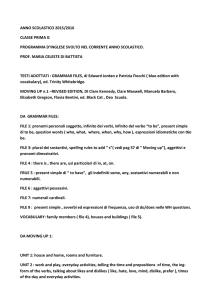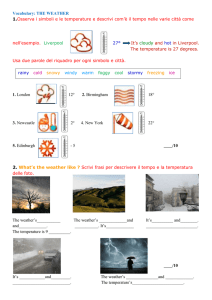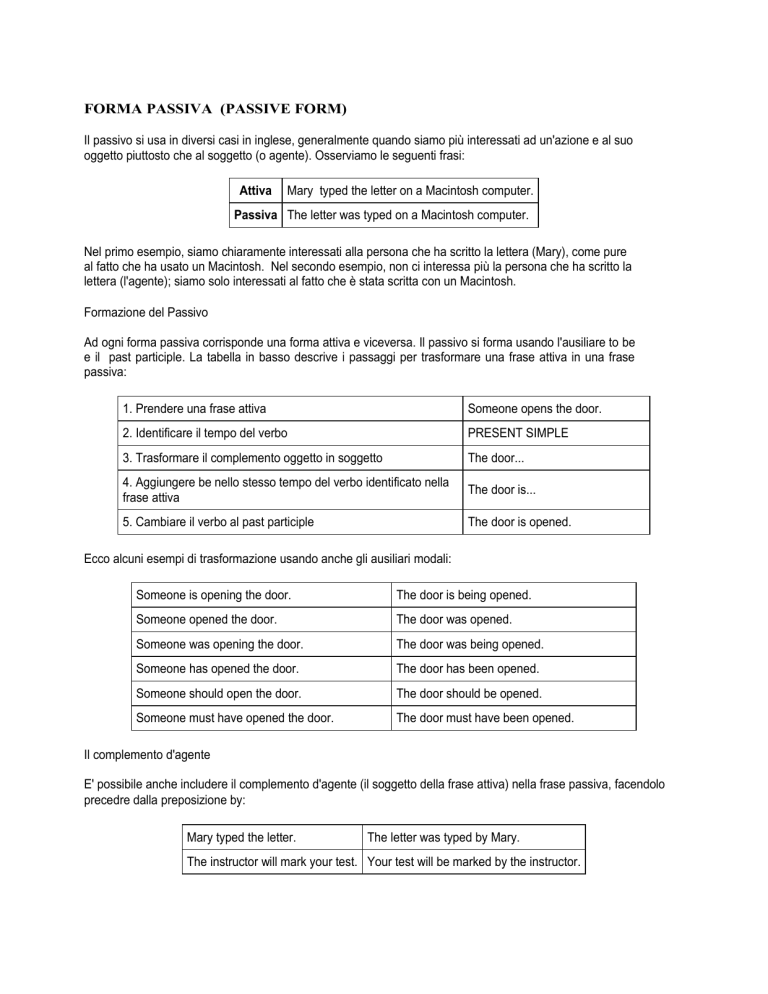
FORMA PASSIVA (PASSIVE FORM)
Il passivo si usa in diversi casi in inglese, generalmente quando siamo più interessati ad un'azione e al suo
oggetto piuttosto che al soggetto (o agente). Osserviamo le seguenti frasi:
Attiva
Mary typed the letter on a Macintosh computer.
Passiva The letter was typed on a Macintosh computer.
Nel primo esempio, siamo chiaramente interessati alla persona che ha scritto la lettera (Mary), come pure
al fatto che ha usato un Macintosh. Nel secondo esempio, non ci interessa più la persona che ha scritto la
lettera (l'agente); siamo solo interessati al fatto che è stata scritta con un Macintosh.
Formazione del Passivo
Ad ogni forma passiva corrisponde una forma attiva e viceversa. Il passivo si forma usando l'ausiliare to be
e il past participle. La tabella in basso descrive i passaggi per trasformare una frase attiva in una frase
passiva:
1. Prendere una frase attiva
Someone opens the door.
2. Identificare il tempo del verbo
PRESENT SIMPLE
3. Trasformare il complemento oggetto in soggetto
The door...
4. Aggiungere be nello stesso tempo del verbo identificato nella
frase attiva
The door is...
5. Cambiare il verbo al past participle
The door is opened.
Ecco alcuni esempi di trasformazione usando anche gli ausiliari modali:
Someone is opening the door.
The door is being opened.
Someone opened the door.
The door was opened.
Someone was opening the door.
The door was being opened.
Someone has opened the door.
The door has been opened.
Someone should open the door.
The door should be opened.
Someone must have opened the door.
The door must have been opened.
Il complemento d'agente
E' possibile anche includere il complemento d'agente (il soggetto della frase attiva) nella frase passiva, facendolo
precedre dalla preposizione by:
Mary typed the letter.
The letter was typed by Mary.
The instructor will mark your test. Your test will be marked by the instructor.
Verbi che non possono essere passivi
Il passivo si forma trasformando un complemento oggetto in soggetto. Pertanto i verbi intransitivi (verbi che non
reggono un complemento oggetto) non possono essere usati nella forma passiva. Alcuni esempi di verbi intransitivi
sono arrive, sleep, die, walk, rain, snow e smile.
Nemmeno alcuni verbi di stato (verbi che descrivono uno stato o una condizione, e che non hanno le forme
progressive) possono essere usati nella forma passiva. Alcuni esempi sono have (=possedere), belong to,
resemble, suit e fit (=essere della misura giusta).
Errori comuni con il passivo
Il passivo è qualche volta confuso con altre due strutture: le forme perfect and continuous (progressivo). Queste
sono le differenze tra loro:
Passivo: be + past participle
The door is closed.
Perfect: have + past participle Someone has closed the door.
Continuous: be + -ING
Someone is closing the door.
Other examples:
Lunch is being served. (Il pranzo viene servito in questo momento). Steam has been condensed in a small vessel.
(Il vapore è stato condensato in un piccolo recipiente). Dogs are not admitted. (Ai cani non è permesso di entrare).
They can’t see us. We can’t be seen. They will open a new restaurant in this area. A new restaurant will be opened
in this area. We gave Tom a bike for his birthday. A bike was given to Tom for his birthday or Tom was given a bike
for his birthday.
They told her the bad news abruptly. She was told the bed news abruptly. Or. The bad news was told to her
abruptly. The roof of my house needs repairing. (Il tetto della mia casa ha bisogno di essere riparato). Your hair
wants washing. (I tuoi capelli hanno bisogno di essere lavati). My new shirt does not iron easily. (La mia nuova
camicia non si stira facilmente). Our goods sell well on the European Market. (La nostra merce si vende bene sul
mercato europeo). (Con i verbi: to open, to close, to wear, to wash, to read, to iron, to sell). They say the group gave
a good performance. It is said that the group gave a good performance. Or. The group is said to have given a good
performance. Everybody says he’s working extra hard to pay his debts. It is said he’s working extra hard to pay his
dets. Or. He is said to be working extra hard to pay his debts. They know the famous singer is arriving on Sunday. It
is known that the famous singer is arriving on Saturday. Or. The famous singer is known to be arriving on Sunday.

